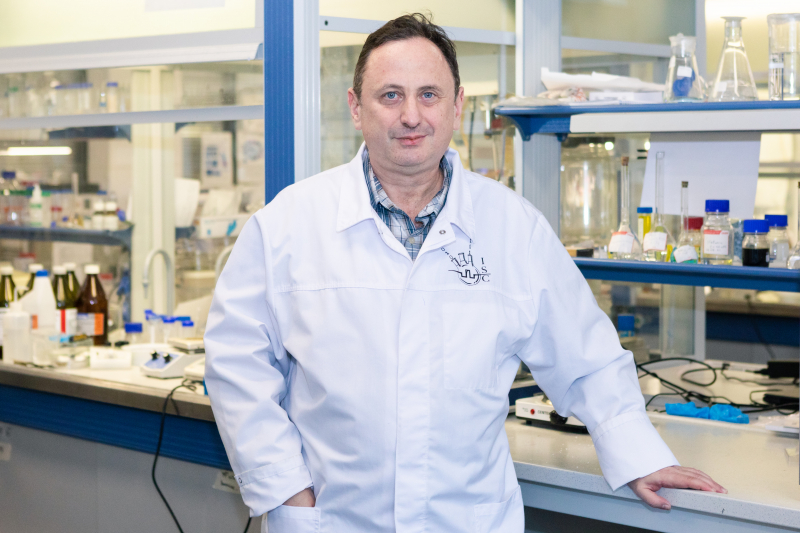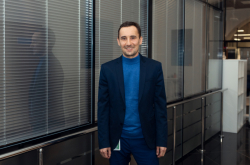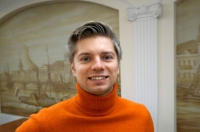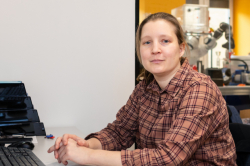You study tribology. What is that?
First of all, tribology is the study of friction and interaction of solid surfaces. It’s an engineering discipline that also has a fundamental significance, because friction is a universal phenomenon. Physics doesn’t do a good job of explaining friction and grounding it in the fundamental laws of the discipline. That’s why I decided to devote my PhD thesis to the stability theory for friction in elastic solids. After that, as a postdoc I got into nanotribology – a field that studies friction and surface interaction on the nanoscale. I gradually started researching the phenomena associated with it, such as capillary action, surface wetting and roughness. For instance, I am really interested in self-organization of surface structures that is often caused by friction.
These days, we are also trying to apply novel computational methods, such as AI and big data, to surface studies – we call this new field triboinformatics. The thing is that friction is not easily explained by fundamental laws of physics, which makes tribology an empirical science with a lot of data on which parameters and materials properties affect friction, and sometimes it’s not easy to understand this massive array of data. The new data analysis methods help us identify new interconnections and patterns that cannot be spotted by simple physical models. I am hoping to be able to use this approach to get a totally new look at friction.
What are the applications of tribology?
Tribology is crucial in economics, because friction is truly ubiquitous – it’s present in transport, engineering, and manufacturing, and a lot of energy is used to overcome it. That’s why it’s so important to learn to control friction with traditional methods, such as lubricants, or new ones, like self-lubricating or specially structured surfaces.
I am also interested in other fields, such as friction in biochemistry and biophysics. For example, now with the spread of coronavirus, developing antibacterial and antiviral surfaces has become a hot topic, just like understanding whether the virus stays on surfaces and how to stop it from clinging to them.
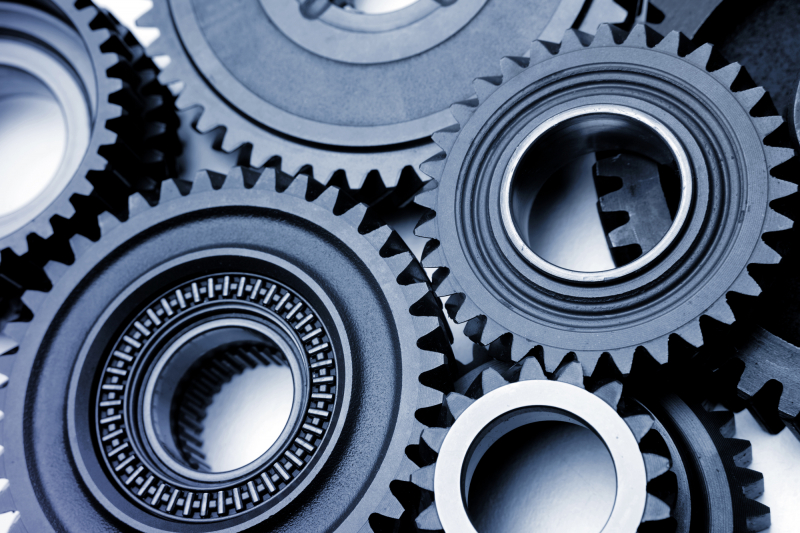
Credit: depositphotos.com
How did you learn about the Fellowship & Professorship program and why did you decide to apply?
At first, I applied for a governmental megagrant for international researchers who want to work in Russia, which I didn’t get. Then I learned about ITMO’s program when I saw an ad in Nature, the world’s most prestigious scientific journal. This program was a lot like a megagrant, and it offered the opportunity to come to ITMO and spend at least four months doing research here. Even though I moved to the US many years ago, I knew about ITMO and its rapid development in the past few years. So I reached out to Ekaterina Skorb, head of ITMO’s Infochemistry Scientific Center, and discovered that there were researchers working on the topics I’d been long interested in, such as self-organization in unusual materials and the use of novel algorithms and methods to process information about physical and chemical systems. She recommended I apply for the program with my topic – triboinformatics.
What about the program appeals to you?
There were several important factors for me. First of all, there are opportunities for empirical studies. I am mostly a theoretician myself, so collaborating with experimental scientists is very useful. For instance, we apply the theory of novel data processing methods to the data acquired from analyzing silicon and brass surfaces subjected to ultrasound and probed using atomic force microscopy.
Second, there are many talented students at ITMO. St. Petersburg has always been a hub for science and education, and the Infochemistry Scientific Center often welcomes contest winners and straight-A students. Third, I am always happy to visit the city because it’s where I grew up and I have many friends and relatives here. But most importantly, this program is a chance for me to acquire new experience and ideas, as well as meet new people.
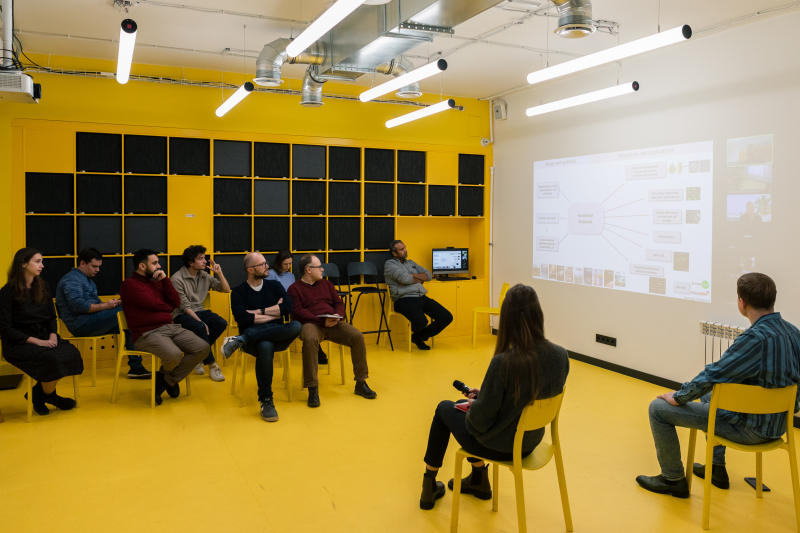
A meeting of participants of ITMO Fellowship & Professorship program. Credit: Dmitry Grigoryev, ITMO.NEWS.
You are currently teaching at the University of Wisconsin–Milwaukee, USA. How do you organize your work at ITMO’s Fellowship & Professorship program when you are in the US?
As per my contract, I spend four months in St. Petersburg every year. My last visit was in the summer of 2021 and I am planning to return for the winter holidays in December. Moreover, each week I hold a seminar with my students over a video call and we discuss our progress. I will also be teaching an intensive course in the blended format: I will hold some lectures online and the others in person when I come to ITMO. But I believe that distance is no longer a problem, as you can easily be in one place and teach in another.
What kind of projects will you be running with students and on your own as part of the Fellowship & Professorship program?
We’re tapping into several topics, among them analyzing data on surface roughness in nanoscale, as well as data from sonochemical surface processing; using vibrations to separate surface phases; applying tribology methods in biochemistry; and more. I work on some of these projects with my colleagues and on some – with my students. Moreover, in 2021 I took part in the Summer School in Infochemistry, where together with school students I conducted quite an interesting project. We ran experiments on bubbles produced in the water by ultrasound and then used neural networks to learn to identify a solution’s concentration by the shape and behavior of such bubbles.
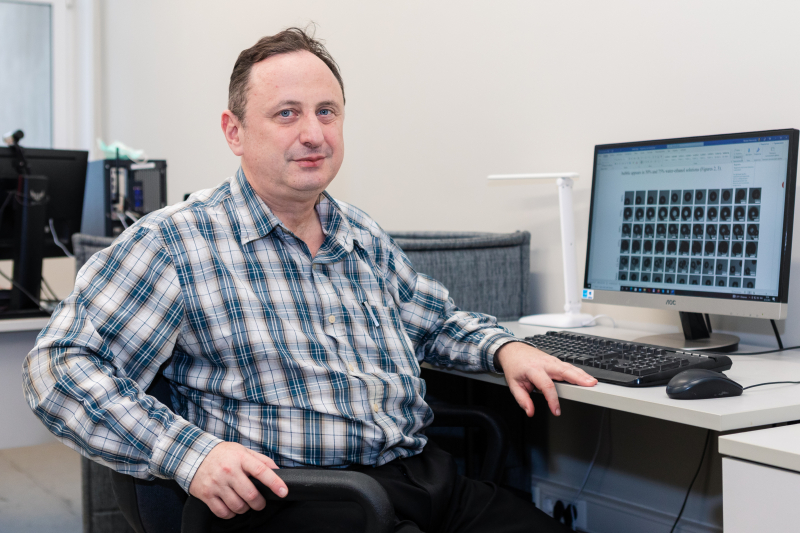
Michael Nosonovsky at ITMO's Infochemistry Scientific Center. Credit: Dmitry Grigoryev, ITMO.NEWS.
Tell us a little bit about your hobbies. I know that you are into Latin dancing and have even been to open classes in St. Petersburg last summer.
I got into Latin dancing relatively recently – only a couple of years ago. I didn’t learn to do any kind of dancing or sports, or to play musical instruments in my youth, but I realized I absolutely had to. It was somewhat of a challenge to me, but I am doing my best. I think we are used to idolizing intelligence in European culture, which makes us forget that our brains aren’t separated from our bodies and they are a single unit. I think that many people engaged in intellectual activities are looking for ways to reconnect with their bodies. That’s why I became interested in dancing – it enhances coordination and motor skills. Moreover, dancing is always a mood booster.
I have another hobby to boot. In St. Petersburg, I majored in Asian studies and I went on expeditions to the Ukraine, the Crimea, the Middle East, and the US to study ancient inscriptions, for instance, on tombstones. Even though it is kind of a hobby, I still did it on a professional level and even published some research articles.
